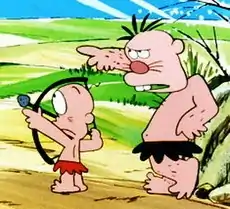| Giatrus | |
 | |
| ギャートルズ (Gyātoruzu) | |
|---|---|
| Genre | Gag |
| Manga | |
| Written by | Shunji Sonoyama |
| Published by | Jitsugyo no Nihon Sha |
| Magazine | Weekly Manga Sunday |
| Original run | 1965 – 1975 |
| Manga | |
| First Human Gon | |
| Written by | Shunji Sonoyama |
| Illustrated by | Hideo Shinoda |
| Published by | Gakken |
| Magazine | Gakushū Magazine |
| Published | 1966 |
| Manga | |
| Written by | Shunji Sonoyama |
| Published by | Shogakukan |
| Magazine | Gakunen Magazine |
| Published | 1974 |
| Anime television series | |
| Directed by | Kenji Kodama |
| Music by | Hiroshi Kamayatsu Mamoru Fujisawa |
| Studio | Tokyo Movie |
| Original network | ABC |
| Original run | October 5, 1974 – March 27, 1976 |
| Episodes | 77 |
| Anime film | |
| Music by | Hiroshi Kamayatsu Joe Hisaishi |
| Studio | Tokyo Movie |
| Released | March 15, 1975 |
| Runtime | 14 minutes |
| Television drama | |
| Back to the Giatrus Days | |
| Written by | Hiroshi Shimokawa |
| Music by | Toshiyuki Watanabe |
| Original network | NHK BS-2 |
| Original run | April 18, 1993 |
| Episodes | 1 |
| Anime television series | |
| First Human Gon | |
| Directed by | Yutaka Kagawa |
| Produced by | Yuji Nunokawa Kyotaro Kimura Ken Suekawa Naoji Hōnokidani (Animation) |
| Written by | Yoshio Urasawa |
| Music by | Yusuke Honma |
| Studio | Studio Pierrot |
| Original network | NHK BS-2 |
| Original run | April 3, 1996 – January 22, 1997 |
| Episodes | 39 |
Giatrus (Japanese: ギャートルズ, Hepburn: Gyātoruzu) is a Japanese manga written and illustrated by Shunji Sonoyama. It spawned two other manga, two anime television series, a television drama, and an anime film. The first TV series mark the debut of Joe Hisaishi, composer of My Neighbor Totoro and Spirited Away. The official English title is Gon, The Stone-Age Boy.[1]
Media
Manga
It was first published from 1965 to 1975 in Jitsugyo no Nihon Sha's Weekly Manga Sunday,[2][3] and spawned two spin-off manga: the first, entitled First Human Gon (はじめ人間ゴン, Hajime Ningen Gon) and illustrated by Hideo Shinoda,[4] was published in Gakken's Gakushū Magazine in 1966;[5] the second, entitled First Human Giatrus (はじめ人間ギャートルズ, Hajime Ningen Gyatoruz), was published by Shogakukan's Gakunen Magazine in 1974.[5]
Shunji Sonoyama won the 1976 Bungeishunjū Manga Award for his work on the manga series.[6]
Anime series
The third manga was adapted by Tokyo Movie into a homonymous anime television series consisting in 77 episodes, which was broadcast on ABC between October 5, 1974, and March 27, 1976.[7][8][9] Another anime was produced; this time Studio Pierrot adapted the second manga into a series directed by Yutaka Kagawa that originally ran from April 3, 1996, to January 22, 1997, in NHK-BS2.[10]
Cast
- First Human Giatrus
- Gon: Hiroko Maruyama
- Father: Kaneta Kimotsuki
- Mother: Keiko Hanagata
- Dotechin: Kazuya Tatekabe
- Piko-chan: Rihoko Yoshida
Source:[9]
- First Human Gon
- Gon: Ikue Ōtani
- Father: Kenichi Ogata
- Mather: Miyuki Ichijō
- Dotechin: Chafurin
- Piko-chan: Tomoko Kawakami
- Mammoth / Saber-tooth tiger: Kazuhiro Ōguro
- Shinigami: Kōji Ishii
Source:[10]
Film
First Human Giatrus was adapted by Tokyo Movie into an anime film, which was released by Toho on March 15, 1975.[11][12]
TV drama
The manga was adapted into a live-action Japanese television drama entitled Back to the Giatrus Days (バック・トゥ・ザ・ギャートルズ・デイズ, Bakku tou za Gyātoruzu Deizu). It was produced by Koji Matsuoka and starred Ryoko Takizawa, Katsuhisa Namase and Toshiya Sakai.[13]
References
- ↑ "GON, THE STONE-AGE BOY (Hajime ningen Gon) : EXPO 2005 AICHI, JAPAN".
- ↑ 戦後昭和史・虎の巻 雑誌/漫画 (in Japanese). Natsukashi. Archived from the original on October 21, 2007. Retrieved June 10, 2013.
- ↑ Eguchi, Kazuhiro (2006). Poser Scene Master: 3Dでよみがえる、あの名場面. BNN. p. 157. ISBN 9784861004117.
- ↑ はじめ人間ゴン (単行本) (in Japanese). ASIN 4052009282.
- 1 2 トリビア (in Japanese). Jitsugyo no Nihon Sha. Archived from the original on May 22, 2013. Retrieved June 10, 2013.
- ↑ "文藝春秋漫画賞". Comic Lab. Archived from the original on June 18, 2009. Retrieved April 2, 2015.
- ↑ Jonathan Clements, Helen McCarthy (2006). The Anime Encyclopedia. Stone Bridge Press, 2006. ISBN 1933330104.
- ↑ Daniel Valentin Simion (2009). Il Dizionario dei Cartoni Animati. Anton, 2009. ISBN 9788890390227.
- 1 2 はじめ人間ギャートルズ (in Japanese). TMS Entertainment. Retrieved June 10, 2013.
- 1 2 はじめ人間ゴン (in Japanese). Studio Pierrot. Retrieved June 10, 2013.
- ↑ 映画 アニメ はじめ人間ギャートルズ (in Japanese). AllCinema Movie & DVD Database. Retrieved June 10, 2013.
- ↑ はじめ人間ギャートルズ (in Japanese). Japanese Movie Database. Retrieved June 10, 2013.
- ↑ ドラマ番組放送記録+カテゴリー小史 1990~1994 (in Japanese). NHK. Archived from the original on September 6, 2013. Retrieved June 10, 2013.
External links
- Official website (in Japanese)
- First Human Giatrus at IMDb
- Hajime Ningen Gyatoruz (anime) at Anime News Network's encyclopedia
- Hajime Ningen Gon (anime) at Anime News Network's encyclopedia